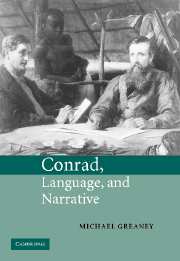4 - Modernist storytelling: ‘Youth’ and ‘Heart of Darkness’
Published online by Cambridge University Press: 22 September 2009
Summary
‘Of all the many narrators within novels’, writes Barbara Hardy, ‘perhaps none combines caring with impartiality more zealously than Conrad's Marlow.’ I suspect that for many readers Charlie Marlow does indeed linger in the memory as an eminently scrupulous and sympathetic narrator whose genius for friendship and exemplary open-mindedness illuminate ‘Youth’, ‘Heart of Darkness’, Lord Jim, and Chance. The very antithesis of Schomberg, for whom storytelling is always and only an outlet for vindictive mendacity, Marlow is presented by his creator as an impeccably scrupulous narrator. But not everyone would agree with Conrad's estimate of Marlow as a ‘most discreet, understanding man’. Indeed, in the light of recent criticism it would not be too difficult to paint an altogether less flattering picture of Conrad's nautical raconteur: Marlow as arch-misogynist, monologic imperial speaker, casual racist. In fact, literary theory has only sharpened the long-standing suspicion over Marlow's credentials as a plausible and trustworthy narrator. Ever since word got out that Henry James (whose good opinion Conrad would have cherished) was in the habit of referring to Marlow as ‘that preposterous master mariner’, many critics have sought to rescue him from the incredulous disdain of his detractors. Conrad called ‘Heart of Darkness’ his ‘Apologia pro Vita Kurtzii’; and much that has been written on Marlow belongs to the same genre. William York Tindall's ‘Apology for Marlow’ typifies the perception that the function of Marlow, far from being self-evident, requires strenuous justification.
- Type
- Chapter
- Information
- Conrad, Language, and Narrative , pp. 57 - 76Publisher: Cambridge University PressPrint publication year: 2001
- 1
- Cited by



